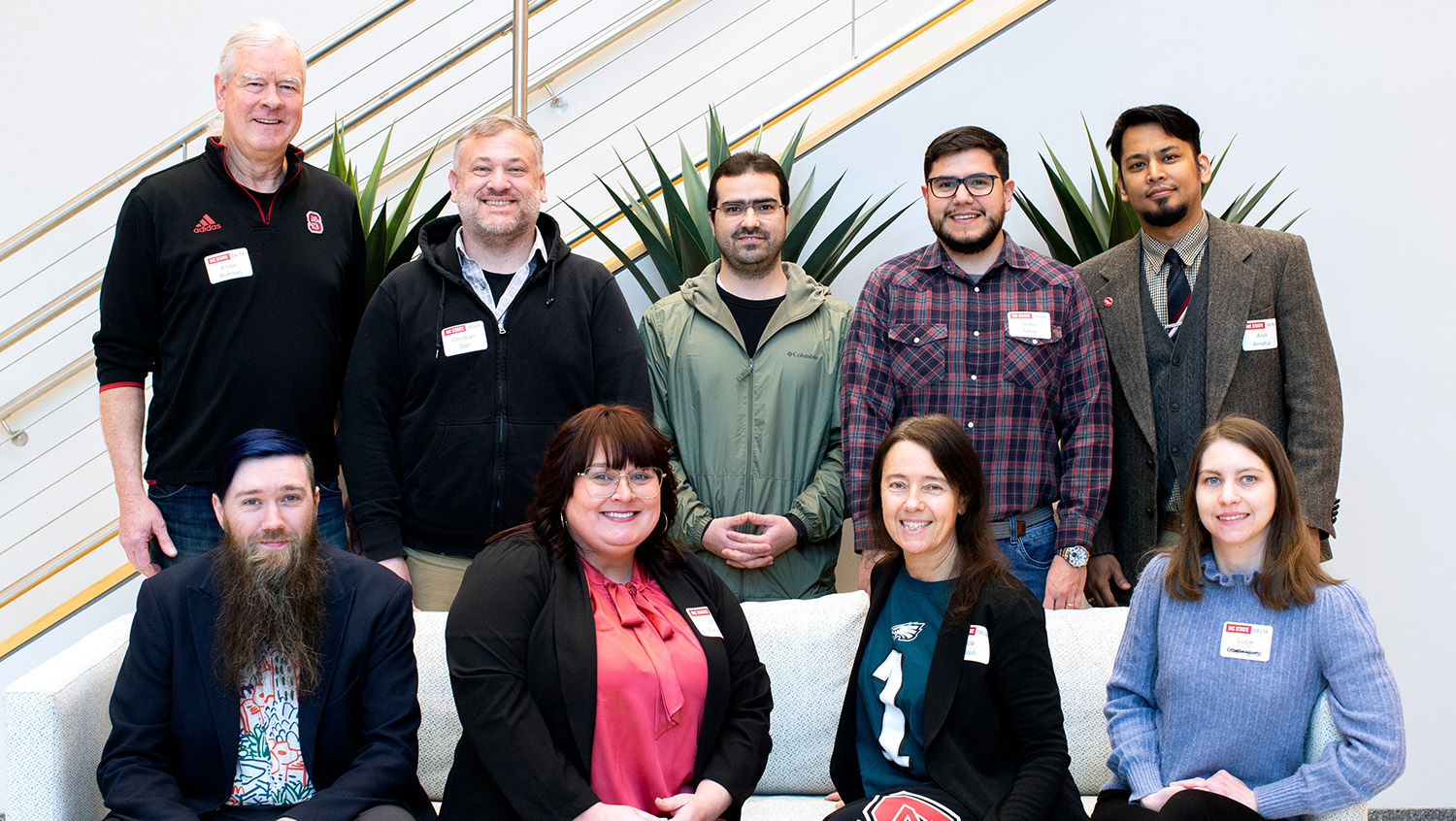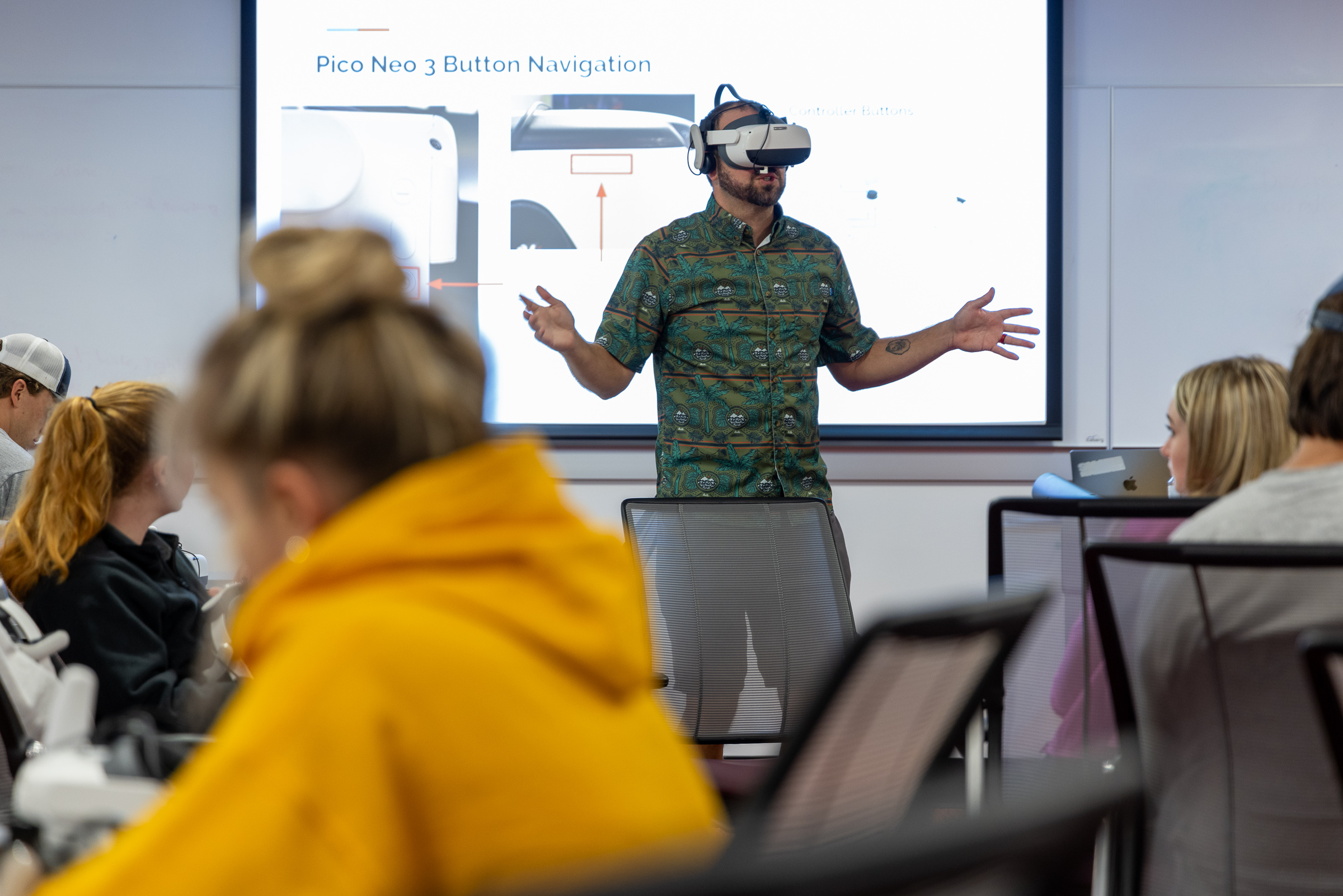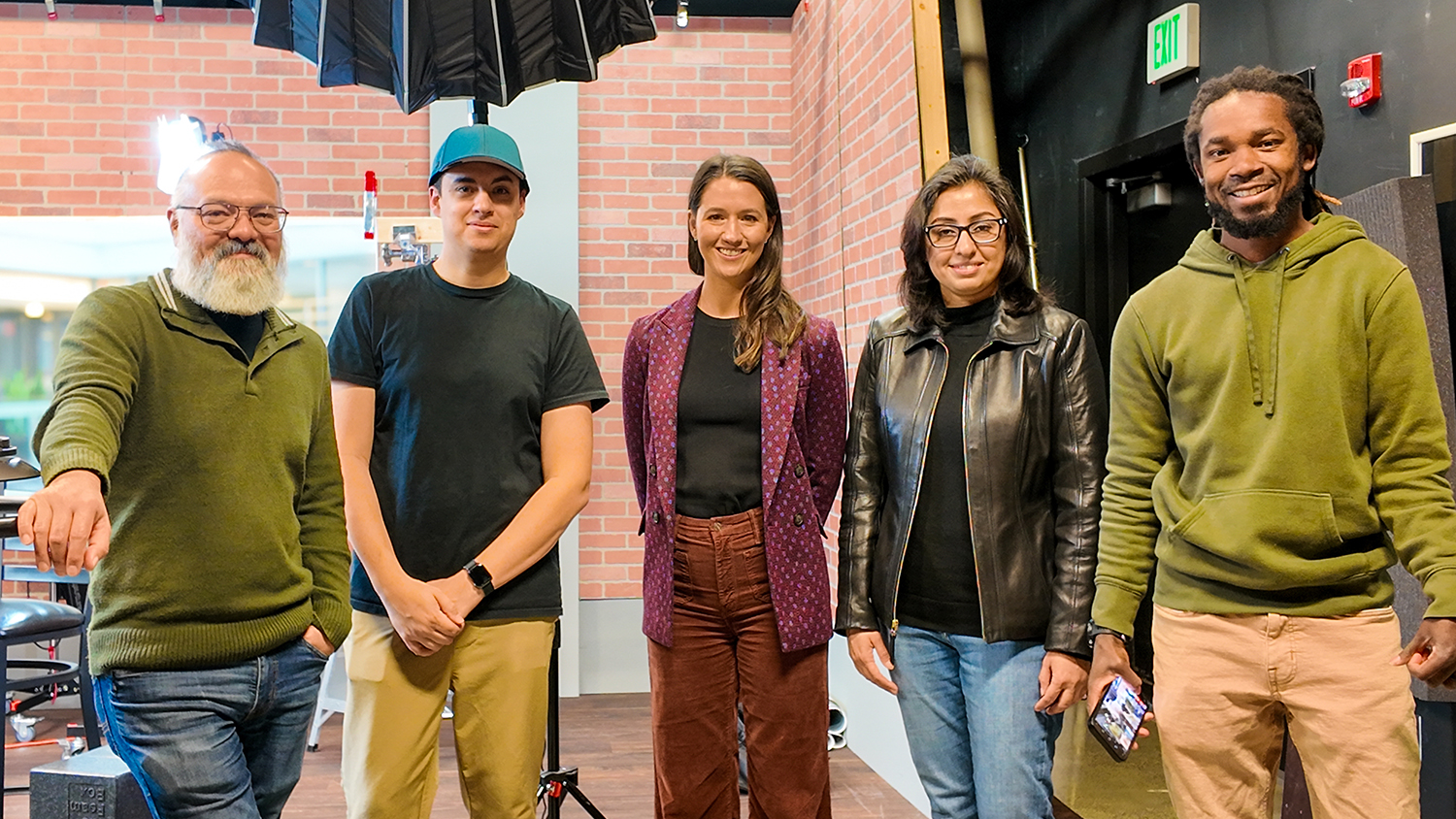Hybrid Learning Grants Utilize AI to Enhance Course Design and Student Learning

NC State University adapts continuously to meet its students’ changing needs, fostering a dynamic and supportive classroom environment. With the 2024-2029 NC State QEP focus on Learning by Doing, the Hybrid Learning Grants strive to support this educational philosophy at the course level by working with faculty to redesign their courses using the hybrid and flipped learning approach that promotes high impact experiences during and after in-person classes.
Recently, the Hybrid Learning Grants began to explore ways of utilizing Generative AI to enhance the hybrid course design process and students’ learning experience. The ultimate goal is to prepare students to become independent thinkers, problem solvers, and innovators in their respective professional fields.
The Hybrid Learning Grant Approach
This hybrid and flipped approach originated from the “flipped classroom” method, in which traditional lectures are moved to the online space for students to learn at their own pace outside of class. This style of course design creates more valuable classroom time for dynamic, hands-on activities that engage students in learning by solving problems and interacting with peers — while having access to immediate instructor guidance.
Following the pandemic, many large undergraduate courses have embraced an authentic hybrid learning approach: dividing classes into smaller groups of students who attend in-person sessions on alternating days. This rotation system creates more intimate classroom settings, fostering meaningful interactions between students and faculty while maintaining the benefits of a full-size course. The Hybrid Learning Grants support the redesign of courses using both methods, and the instructors are not required to reduce the class time or size.
The Hybrid Learning Grants use a cohort model that provides cohort sessions and individual mentoring sessions in alternative weeks throughout the design and development phase. Building upon the 2023-24 pilot cohort with three courses, the official launch of the Hybrid Learning Grants started with seven courses in the 2024-25 grant cycle.
To provide high quality course design support at an increased scale, DELTA Instructional Designer Yan Shen progressively leveraged AI (primarily ChatGPT) to assist cohort instructors’ in applying the Hybrid/Flipped Course Design Framework and Design Process as they worked on their course redesign projects.
AI Exploration for Hybrid Learning
How it started
The initial AI exploration for course design started in 2023 when Shen created a ChatGPT prompt template for writing module-level learning objectives after participating in a webinar hosted by Iowa State University about using ChatGPT to boost research and teaching. Working together, Lead Instructional Designer Christine Cranford and Shen collaborated with BIO 181 instructor Lisa Paciulli using the prompt template to develop focused learning objectives that aligned with her course’s module content. Their innovation proved valuable beyond this initial application — they presented their prompt template and method at both the 2023 Quality Matters Conference and 2024 Conference on Faculty Excellence Conference, where it garnered significant interest from faculty members.
In anticipation of expanding the Hybrid Learning (HL) Grants cohort for 2024-25, Shen expanded her toolkit by developing additional ChatGPT prompt templates. These new templates support the key course design steps she established for the HL Grants, encompassing everything from defining course learning objectives and competencies to creating content organization and active learning opportunities. Shen and Cranford collaborated with the 2024-25 HL Grants instructors to use those templates for their course design from the very beginning and tremendously improved the efficiency and quality of creating the big picture design for each course.
The structured approach proved particularly valuable for faculty with limited AI experience, providing them with accessible entry points to leverage this powerful technology.
“I hadn’t played with a whole lot of AI before this (grant),” Senior Lecturer Jodi Wahba explained. “Being provided very specific prompts taught me what to ask and really helped expand my skill set and allowed me to get very comfortable with it (AI).”
Beyond AI skill development, instructors recognized how these prompt templates could create valuable educational opportunities for their own students.
“This is the first time that I used an instruction-related prompting application that I thought was great as a user,” Academic Advisor and Lecturer Julio E Terán said. “Yan gave me a structure that was already validated and it yields results that are good. Also, it allows you to think about how you can do something similar for your students allowing them to have the same positive experience with using AI prompts. You can give them guidance on how to develop productive prompts — skills they can take with them moving forward.”
Leveling Up
However, the story didn’t stop there. Both Shen and Cranford attended the 2024 Online Learning Consortium conference and presented on the hybrid/flipped course design framework and design process. Despite drawing smaller audiences than AI-focused presentations, Shen recognized that their innovative approach positions them at the forefront of elevating hybrid and flipped course design through fast-growing GenAI.
A presentation by Arizona State University instructional designers, showcasing methods of using ChatGPT to create instructional design tools, sparked Shen’s vision for a new approach. She recognized that custom GPTs could offer more sophisticated support than traditional prompt templates through predefined interaction processes and designated knowledge sources, not only streamlining the hybrid/flipped course design process but also helping to resolve specific learning challenges inherent to these pedagogical methods.
Upon returning from the conference, Shen partnered with COM 112 Interpersonal Communications instructor Jodi Wahba to develop a custom GPT called “Reflective Journaling Assistant.” This tool revolutionized the feedback process for weekly student reflections in Wahba’s large classes of 200-300 students.
Previously, with just one teaching assistant, providing individual feedback was unfeasible on a weekly basis. The new AI assistant evaluates student drafts using a carefully structured rubric, offering detailed insights on strong points, areas for improvement, and thought-provoking questions to deepen students’ reflection. Students are encouraged to revise their work based on the AI feedback before submitting for grading.
Shen and Wahba implemented a pilot version of the Reflective Journaling Assistant in Wahba’s Spring 2025 COM 112 course, using this pre-redesign phase to evaluate both the pedagogical effectiveness and technical performance of the tool. Presented as an optional tool for getting feedback before submitting, the custom GPT currently has 366 chats so far in the semester, indicating that possibly 15% of students have been using this tool.
“A good portion of my students’ grades are from discussion questions,” Wahba said. “We trained the custom GPT with the discussion post expectations and rubrics. Students go in and tell it what the specific discussion assignment is for that week and it gives them feedback such as: You might want to expand on this, or consider adding this topic. But it won’t give them the answers.”
According to experienced COM 112 teaching assistant Katelin Mueller, who has graded for the course for several years, students’ original discussion posts showed overall improvement, with a notably larger proportion of students meeting the expected standards.
Recent Development
Since working with Wahba on COM 112, Shen has also been collaborating with three other HL cohort instructors on designing custom GPTs to enhance student learning in their hybrid/flipped courses:
- ACC 210: Concepts of Financial Reporting – Professor of Accounting and Associate Director of Enterprise Risk Management Initiative Bruce Branson worked with Shen on constructing a Problem Session Exercise Assistant that answers students’ questions and provides step-by-step guidance for the accounting problems that they have already attempted on their own, in both before-class and after-class learning settings. A pilot version of this tool is currently being tested in his spring 2025 course.
- BCH 451: Principles of BioChemistry – Assistant Professor Ning Sui is working with Shen on creating a Content Learning Assistant with three functionalities: 1) Clarifying difficult concepts during online conceptual learning to inform note taking, 2) developing personalized study guides that synthesize students’ lecture notes across topics, 3) generating quiz questions for requested topics to help students practice learned concepts. Sui is currently developing her course materials that will be used to train the Content Learning Assistant to provide course-specific responses.
“My biggest motivation to create a bot for my course was to create a personalized AI tutor for my students that is available 24/7,” Sui said. “For my course, there are probably 100 different knowledge points for each lecture. Students get some of them but they are often missing the connections. I have experimented with other AI tools and Chat GPT is the most effective because it provides the background knowledge needed along with step-by-step instructions on how to solve the problems. So, when students hit a roadblock and are not sure how to proceed, instead of giving up, they have this on-demand tool that can clarify and guide them through the assignments. In that respect, it is a very powerful tool.”
- E 101: Introduction to Engineering and Problem Solving – Academic Advisor and Lecturer Julio E Terán is working with Shen on creating a Learn and Reflect Assistant that clarifies students’ questions about the new concepts during weekly online learning and helps them come up with ideas of applying the new concepts to their semester-long engineering challenge project. Terán is currently developing course materials and preparing project materials for individual engineering challenges that will be used to train the Learn and Reflect Assistant to provide responses that are not course-specific, but also pertinent to individual engineering fields that students respectively engage with.
“One of the things I anticipate from this AI tool is to lower some of the barriers that are inherent to instruction,” Terán said. “I teach first-year students and they want to shine in their classes. They think that if they ask questions or are not clear about something, they will look dumb. So, they don’t ask clarifying questions and just try to do it on their own. This tool will allow them to ask more questions in a manner that removes any shame from the process. They are free to ask any basic question and will get helpful guidance in response. The implementation of this tool will be like having an additional TA to assist and provide an alternative to my teaching style.”
In the meantime, Shen has been building upon her initial prompt templates to create custom GPTs that can better serve instructors during the hybrid/flipped course design process. Using the instructional design principles, strategies, and example accumulated over the years, Shen designed and trained a set of custom GPTs to help instructors with different course design tasks, including defining course objectives and course competencies, telling a story about the learning outcomes to students, organizing the course content structure, creating application contexts (e.g., class activities, assignments, projects), writing module-level learning objectives, developing online lecture materials (e.g., outlines, scripts, self-check questions), designing in-class activities and process, creating cross-topic project instructions and tasks and generating learning strategies based on the course design and student input. These AI tools serve as versatile collaborators that allow faculty to maintain their unique vision while benefiting from new pedagogical ideas.
“In my course, I already have a lot of materials that I want to use, and I have a vision of how I want this course to be.” Sui said. “Yan built in some of the best practices behind the design of the custom GPT. I kind of dump my materials and what I want to do in (the custom GPT tool), and it helps me to streamline the process and make sure I am going in the right direction. I can’t rely on it to develop the materials or activities but I am using it to double-check and to help me structure the activities.”
Even experienced instructors find that the AI tools bring renewed creativity to their teaching approach.
“One of the best aspects of it is the lecture design,” said Wahba. “I have taught this course over a hundred times and though new material is added, the basics remain the same. Putting it (materials) into this tool helped to give me a fresh perspective on the topics I discuss and suggested creative questions for the start of each lecture, leading to a presentation style that made the course feel new for me.”
Shen and Cranford are looking forward to implementing and improving those custom GPTs with instructors in the next Hybrid Learning Grants cohort, while also collecting data to assess the impact of the AI-enhanced hybrid/flipped course design on students’ learning outcomes and experience with the previous cohort.
DELTA Hybrid Learning Grants Process
DELTA will continue to provide support to faculty who are interested in exploring custom GPT designs and evaluating their impact on resolving teaching and learning challenges. As generative AI technologies continue to transform higher education, DELTA stands prepared to support instructors in effectively integrating these tools into hybrid learning environments.
Instructors who are awarded Hybrid Learning Grants will be guided through the process of developing and launching their hybrid learning courses. When appropriate, custom GPTs will be used. DELTA will also assist with developing and collecting assessment data to examine the impact of the new course format as well as the students’ perceptions of the hybrid course design.
Within the cohort setting, participants can meaningfully explore the strategic applications of custom generative AI tools and refined prompt engineering techniques. Much can be learned in this collegial space while exploring ways of using AI to enhance student learning in hybrid settings.
Have questions? Read more about the DELTA Hybrid Learning Grants or general FAQs about DELTA Grants. The 2025 DELTA Grants submission system opens on Monday, April 14 at 8 a.m. and closes on Friday, May 9 at 5 p.m.
- Categories:


